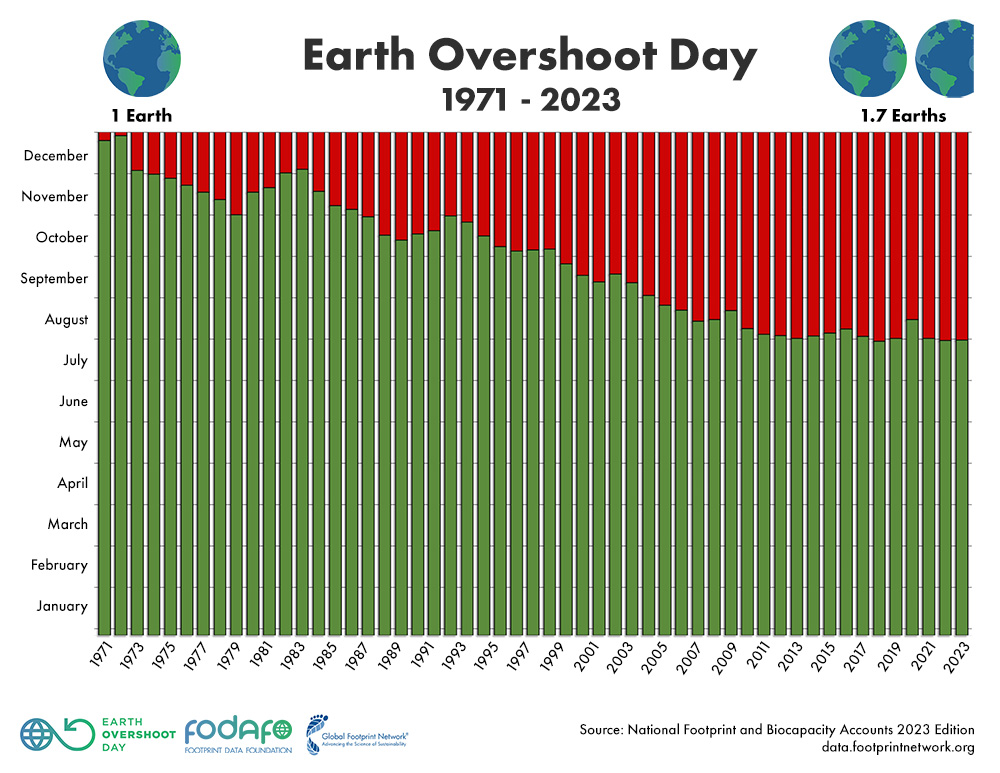Stockholm (NordSIP) – Following the country overshoot days for Denmark, Finland, Sweden and Norway in March and April, the rest of the world has finally caught up with the Nordics. According to the Global Footprint Network (GFN), on August 2nd, the planet observed Earth Overshoot Day – the day when humanity’s demand for ecological resources and services exceeds what planet Earth was expected to be able to regenerate during 2023.
The day occurs one day later than last year, according to the GFN, who published its estimate for the date at the start of June. “For the last 5 years the trend has flattened. How much of this is driven by economic slow-down or deliberate decarbonization efforts is difficult to discern. Still, overshoot reduction is far too slow. To reach the UN’s IPCC target of reducing carbon emissions 43% worldwide by 2030 compared to 2010 would require moving Earth Overshoot Day 19 days annually for the next seven years,” the GFN argued on that occasion.

GFN CEO Steven Tebbe warns that “persistent overshoot leads to ever more prominent symptoms including unusual heat waves, forest fires, droughts, and floods, with the risk of compromising food production. This underscores the interest for cities, countries, and business entities to foster their own resource security if they want to prosper. The world would benefit as well.”
Ecological Footprint Reduction Targets – A Pivotal Tool
As is now customary, the date was marked together with the Republic of Slovenia, which now recognises the Ecological Footprint as a pivotal metric. To spotlight this issue, the Ministry and Global Footprint Network organised a high-level event on August 1st, held in Ljubljana and online, to discuss the implications of overshoot.
“Overshoot is a threat to Slovenia’s long-term success. Therefore, Slovenia adopted an Ecological Footprint reduction target and collaborates with organizations like Global Footprint Network to achieve this,” said Bojan Kumer, Slovenia’s Minister of the Environment, Climate and Energy.
“We are now deciding what kind of country we want to live in for the next 20 or 30 years.” said the President of the Republic of Slovenia Nataša Pirc Musar, calling for action to ensure that Slovenia becomes “a modern, green and technologically innovative country in the coming decades; a country which young people will no longer wish to leave, but one where they will be able to live and work in a safe, attractive and creative home environment.”
UN Climate Change High-Level Champion for COP28 and IUCN President Razan Al Mubarak notes the Ecological Footprint’s utility. “With this metric in hand, any country, region, city, or company can assess its current standing and determine how it can contribute to postponing this date (Earth Overshoot Day).” It provides valuable insights for forward-thinking strategies that address resource security and enable the transition towards a sustainable economy.
The Power of Possibility and Circular Solutions.
The GFN highlights that “circular businesses are reversing overshoot” and that every city, company, or country should step up and protect its own ability to operate in the future.
Given a predictable future of more climate change and resource constraints, and in the face of extremely slow international agreements, the GFN celebrated the fact that a new generation of circular-economy-focused companies operate while also reducing overshoot.
“Enabling circular solutions gives companies the best chance to succeed in the predictable future” says Steven Tebbe, CEO of Global Footprint Network. “There are many examples that demonstrate how. They symbolize the Power of Possibility (POP).” POP is a GFN platform highlights many ways we can improve our resource security in five key areas (healthy planet, cities, energy, food, and population).
The GFN highlights two success cases. Eberhard, a Swiss construction company, which recovers mixed construction waste in the first plant in Europe and turn it into new, high-quality circular secondary raw material. One application is a low-carbon, circular concrete that is largely composed of recycled materials (zirkulit®). According to the GFN, if such concrete were used worldwide instead of conventional one, Earth Overshoot Day would move by 2.4 days. In the wastewater sector, Interzero, a Germany recycling company, whose services the GFN argues delay reduces Earth Overshoot Day by 7 minutes and 16 seconds. Based on Interzero’s data, GFN researchers calculated that for every annual €1 value added the company generates with their zero waste solutions, global overshoot shrinks by over 32 global square meters.
Nature Restoration
According to the GFN, Earth Overshoot Day coincides with the European Parliament’s recent vote on the Nature Restoration Law. The network argues that the persistence of overshoot has led to land and soil degradation, fish stock depletion, deforestation, biodiversity loss, and greenhouse gas accumulation. “These symptoms are becoming more prominent daily across the planet, with unusual heat waves, wildfires, droughts, and floods, exacerbating the competition for food and energy,” the GFN explains.
At the time the Nature Restoration Law was passed, NordSIP noted that there were mixed emotions on both sides of the argument. Conservative political parties, the agriculture and fisheries lobbies, particularly in the Netherlands, Poland, and Italy, mainly focused on a perceived loss of arable land and increased production costs. On the other hand, left wing parties, the scientific community and business all seem to have been positive about the law.


